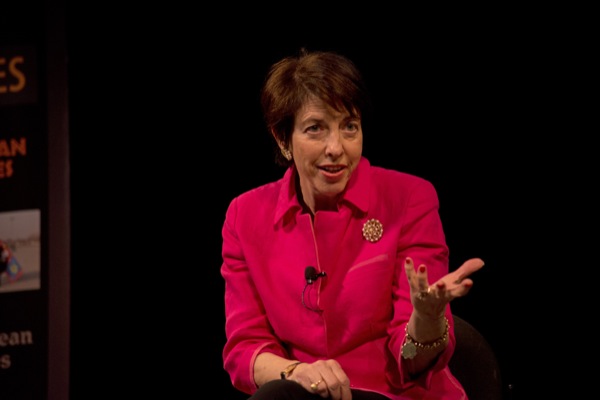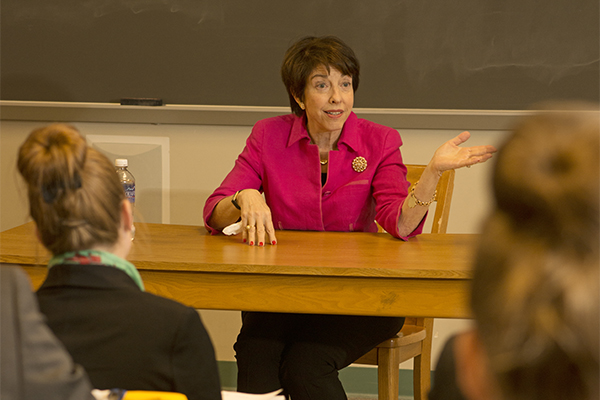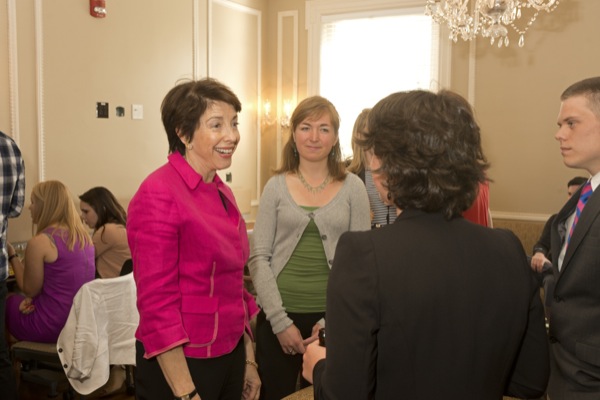


Global Agenda
China's challenge lies not in economy but in fragile political system, expert says
9:01 a.m., April 25, 2014--The way Americans view China and the realities of that nation’s political infrastructure may be vastly different, an expert on Asian affairs told a large University of Delaware Global Agenda audience Wednesday night, April 23, in Mitchell Hall.
China has the world’s fastest growing economy and the danger lies not in the country’s astounding growth but rather in its fragile political system and the insecurities of its leaders, said Susan Shirk, chair of the 21st Century China Program and Ho Miu Lam Professor of China and Pacific Relations at the University of California, San Diego.
Global Stories
Fulbright awards
Peace Corps plans
Shirk, who served as deputy assistant Secretary of State in the Bureau of East Asia and Pacific Affairs with responsibility for China, Taiwan, Hong Kong and Mongolia in the Clinton Administration, spoke on the topic “China’s Challenges.”
A fragile state
Shirk said there is an American perception that because China is seen as a strong power, it inevitably represents a threat to the U.S.
Shirk said she disagrees, and argued that China’s future is a work in progress driven by Chinese domestic politics, which can be hard to predict, and U.S. policies that can play a role in shaping that nation’s future.
“China is a fragile super power,” said Shirk.
In discussions about China, Shirk said she found that an American audience might find the word fragile strange, but a Chinese audience would find the label “super power” equally peculiar.
China has the second largest economy and has a per capita income less than one third of the U.S. Behind the headlines, China is extremely insecure, worrying about reaching the end of its reign in such an open and dynamic economy, said Shirk. Its leaders watch the nationalist mode in the public closely because of this insecurity.
“China’s leadership both stokes Chinese nationalism and is afraid of it,” she said. “It is not military strength but internal fragility that they cannot back down from because of the fear of internal support and interest groups.”
Leadership is so focused on domestic threats, rather than international threats, that it could affect economic development.
Can China rise peacefully?
“Rising powers generally lead to military conflict,” said Shirk. “China and the U.S. are trying to write new history and manage a relationship that won’t lead to conflict. Both are committed, but international policy features may make it hard for them to restrain themselves.”
The domestic pressures China faces may put the countries on conflicting courses of action.
The relationship between the U.S. and China has had its share of difficulties. A number of East Asian countries have historically looked to the U.S. as a potential partner to push back against Chinese regional influence. This, in turn, has led to competing geopolitical preferences between China and its neighboring countries.
“China’s misconception of U.S. foreign policy has been highlighted in China’s foreign media, which has had an impact on China’s elites,” said Shirk. “They think the U.S. has manipulated their neighbors into standing with the U.S. and created a balancing coalition to contain China.”
China’s President Xi Jinping has made changes in the government, including decreasing the politburo size for a more cohesive process of deliberation and to keep potential interest groups from going off on their own, improving Internet security, and developing a massive anti-corruption plan, all in an effort to improve dynamics and order.
“We see that Xi Jinping appears to want to maintain a good relationship with the U.S., and he is the one who liked the idea of having an informal meeting with Obama,” said Shirk. “It is too early to say if these problems in the Chinese system are being resolved and if China will be able to rise peacefully.”
Global Agenda: The class
Students in the Global Agenda class, POSC/COMM 444, to which Shirk spoke prior to the evening lecture, learned about her personal journey.
Shirk opened the evening lecture saying, “It’s been great talking to them personally and talking about their plans. I am impressed with the talent here and the interest in international affairs.”
Students heard about Shirk’s prestigious academic experiences and opportunities, travels, astonishing moments with political figures, and more.
Chelsey Rodowicz, a senior communication major, was inspired by Shirk’s passion for taking chances, traveling as much as possible and learning new languages.
“It’s definitely inspiring, all she has done in her career. It is really interesting to get a different perspective about the East,” said Rodowicz.
Melissa Verlaque, a junior international relations and history major, said she enjoyed listening to Shirk’s perspective and her advice on political internships, which many students in the class will be doing this summer.
“It is cool to see we both started in the same place and one day, hopefully, I can be where she is,” said Verlaque.
Some students like Kait Houser, a senior political science major, felt comforted by Shirk’s advice to not have a grand plan for you life. “What resonated with me the most was: don’t make a plan. Get an internship, go abroad; that’s how you find out what you are passionate about.”
“Don’t over plan. Be brave at being adventurous,” said Shirk. “Life works out in mysterious ways. I started studying China when no American could even go there because I was fascinated by it, not because of a game plan.”
Global Agenda continues
The Global Agenda series, which this year has the theme “Global Demands, Regional Responses,” continues on Wednesday, April 30, with the final speaker being Michael Reid, the Americas editor of The Economist.
The talk will begin at 7:30 p.m. in Mitchell Hall and is free and open to the public.
Global Agenda is presented by the Center for Global and Area Studies and sponsored by the Institute for Global Studies, the Center for Political Communication, the Department of Communication and the Department of Political Science and International Relations.
Article by Elizabeth Adams
Photos by Duane Perry










